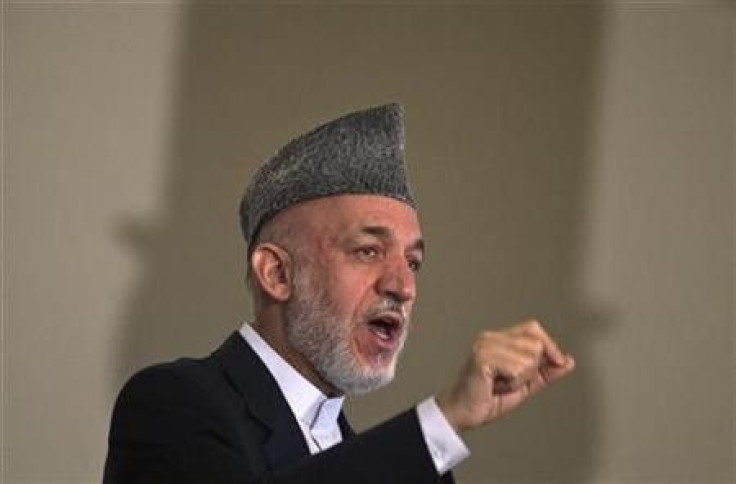Karzai Pleads for Continued Western Support of Afghanistan

The president of Afghanistan Hamid Karzai has urged foreign leaders to continue to support his war-battered country even after NATO troops depart in 2014.
Speaking at a global summit in Bonn, Germany, Karzai pleaded to the gathered delegates: Our young democracy remains fragile, suggesting that Afghanistan needs foreign assistance to assure stability and prevent extremists like the Taliban from retaking control.
The people of Afghanistan are looking to this conference for clear affirmation of commitment to make security transition and economic progress irreversible, he told the summit members.
Our shared goal of a stable, self-reliant Afghanistan is far from being achieved. If we lose this fight, we are threatened with a return to a situation like that before Sept 11, 2001.”
He also suggested Kabul would need financial and other types of support for at least a decade beyond the withdrawal of foreign troops.
Speaking directly to western powers, Karzai said: Your continued solidarity, your commitment and support will be crucial so that we can consolidate our gains and continue to address the challenges that remain. We will need your steadfast support for at least another decade. We will need training for our own troops. We will need equipment for the army and police and help to set up state institutions.
U.S. Secretary of State Hillary Clinton, who is attending the summit, vowed that her government will continue to support Afghanistan and stay the course with our friends in Afghanistan.”
BBC reported that, to maintain present levels of economic development, Afghanistan will need £4.5 billion ($7-billion) of foreign aid annually by 2020.
Meanwhile, Afghanistan’s key neighbor Pakistan is boycotting the conference to protest an attack by NATO forces that killed two dozen Pakistani soldiers late last month. (NATO officials and U.S. President Barack Obama have both since apologized for the cross-border killings).
Bilal Sarwary, a BBC correspondent in Bonn, wrote of Pakistan’s absence from the summit: “Kabul and the international community may be playing down the absence of Pakistan, but the truth is more complex. Kabul had been hoping that Bonn would be where the international community pressured Pakistan to allow peace talks with Taliban leaders. It also wanted leaders to ask for guarantees that Pakistan will stop ‘interfering in Afghanistan's internal matter' as one senior Afghan aide put it. That is now not possible.”
Without Pakistan being part of the process, peace talks with the Taliban might not be possible.
Karzai also expressed his concerns over “sanctuaries” for terrorists outside Afghanistan – an obvious reference at Pakistan – which presents grave security concerns for the region.
Germany’s Foreign Minister Guido Westerwelle stated: Our objective is a peaceful Afghanistan that will never again become a safe haven for international terrorism.”
Perhaps surprisingly, Iran is also attending the Bonn conference and is using its appearance to criticize the continued presence of Western troops in Afghanistan.
Certain Western countries seek to extend their military presence in Afghanistan beyond 2014 by maintaining their military bases there. We deem such an approach to be contradictory to efforts to sustain stability and security in Afghanistan, Iranian Foreign Minister Ali Akbar Salehi said.
We believe that any international or regional initiative to restore peace and security in Afghanistan could only be successful if they discard the presence of foreign military forces and especially ... the founding of foreign military bases in Afghanistan.
Afghanistan also must deal with a fragile economy and try to presence gains that women have made in the country over the past ten years.
Sarwary of the BBC added: “There are other stakeholders here too. For example, Afghan women's groups want international guarantees and backing to consolidate gains made for women. But analysts warn that Afghanistan's road to peace is paved with peril and it can only be achieved if the international community commits to a long-term policy for Afghanistan.”
Separately, Germany’s Bild newspaper, citing German intelligence sources, reported that Karzai seeks to hold onto his power after 2014, which would exceed his two-term limit as president.
The reason is believed to be Karzai's wish not to step down, although he has indicated publicly he does not plan to extend his term in office, Bild stated.
“According to intelligence findings, Karzai is holding exploratory talks with prominent Afghan politicians [to restructure the government].”
© Copyright IBTimes 2024. All rights reserved.











